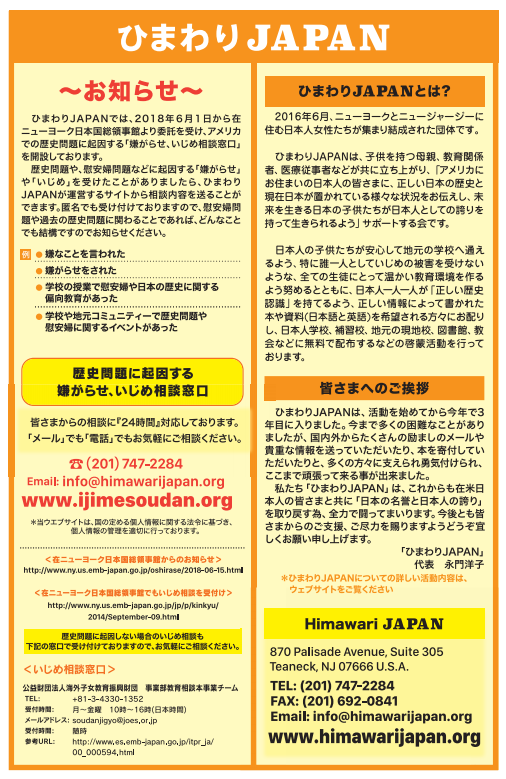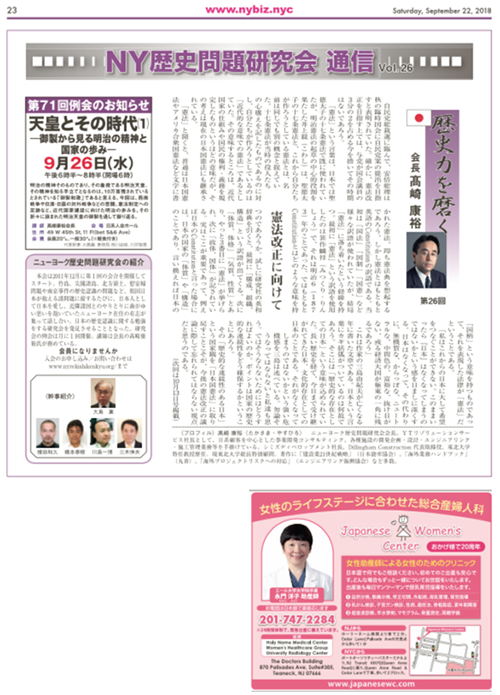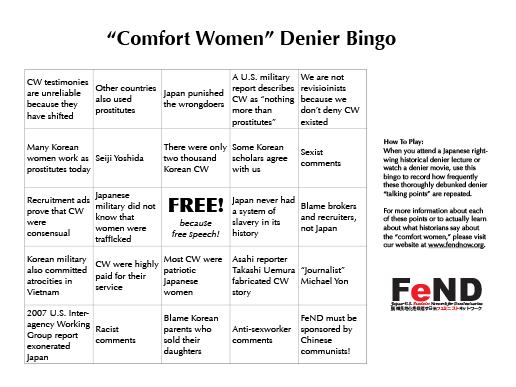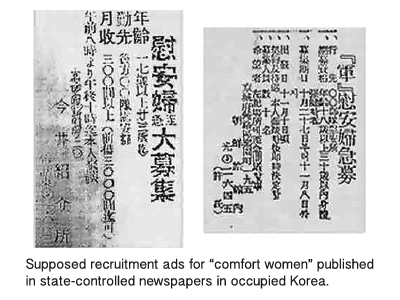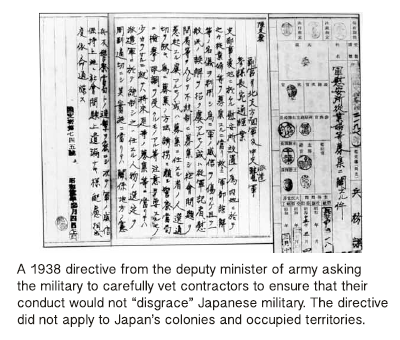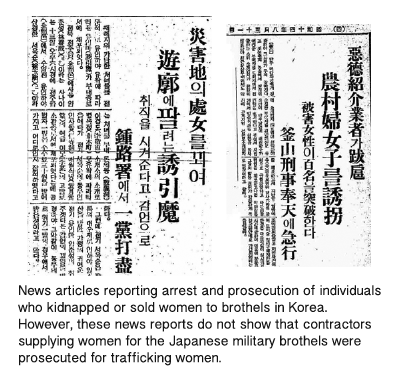“Comfort women” is a historical term referring to the women who performed sexual labor in Japan’s military brothels (“comfort stations”) across Asia and the Pacific during its imperial wars, 1938-1945.
Experiences of “comfort women” were varied: some women, especially in the early years, were recruited from existing brothels in Japan as a way to pay off their debts more quickly; other women, mainly from Japan’s colonies (Korea and Taiwan) and occupied territories, were deceived with the promise of lucrative career, or were outright kidnapped and forced into the system.
Below are some of the most commonly encountered Japanese “comfort women” denier talking points, and the facts according to actual historians. We plan to provide more detailed analysis and documentation for each of these points on this blog, but for now here is what you need to know.
*****
TALKING POINT: “The 1944 U.S. military report says that ‘comfort women’ are just prostitutes!”
FACT: They are taking a sentence out of context. The same document clearly states that most women were deceived with the promise of a good job and forced to perform sexual acts on Japanese soldiers under debt bondage. That describes victims of human trafficking, not women voluntarily engaging in prostitution. [Read more about this]
TALKING POINT: “The 1944 U.S. military report also says that ‘comfort women’ received exceedingly high salaries!”
FACT: According to the same document, many women suffered in poverty because their nominally high earnings were taken away by the Japanese “house masters” as debt repayment and living expenses, which the women had to procure from them. [Read more about this]
TALKING POINT: “Korean newspapers at the time published ads recruiting ‘comfort women,’ which proves that they were voluntary!”
FACT: Most Korean women who became “comfort women” were not literate, so the ads were not designed to entice them. The ads (and only two such ads have been discovered) were placed by contractors to entice private recruiters and subcontractors to go out and recruit the women. [Read more about this]
TALKING POINT: “News reports from the era show that Japanese government arrested and prosecuted contractors that kidnapped and trafficked Korean women!”
FACT: Japanese government prosecuted kidnappers and traffickers in general, but those were not contractors that are kidnapping and trafficking women on behalf of the Japanese military (except for recruitment in Japan–see the next point). [Read more about this]
TALKING POINT: “Japanese government issued a directive ordering the military to carefully select contractors to avoid those that engage in kidnapping and trafficking!”
FACT: The 1938 directive was issued in response to an incident in which local police in Japan detained a contractor recruiting women as “comfort women” for the Japanese military. The local police did not realize that Japanese military was directly involved in establishing and operating brothels, and assumed that the contractor was falsely claiming to be working for the military. This incident led to the directive urging greater coordination between military contractors and local police departments and requiring the contractors to conceal their ties to the Japanese military publicly so as to not embarrass the military. The directive only applies to recruitment in Japan, and excludes its colonies of Korea and Taiwan. There are no comparable directives addressing deceptive or illegal recruitment outside of mainland Japan. [Read more about this]
TALKING POINT: “If any kidnapping or trafficking happened, it was done by private recruiters or businesses operating brothels, and not by the Japanese military! Or they were simply sold by their parents to pay off debts!”
FACT: Japanese military built or requested contractors to build “comfort stations,” provided special documents to women who did not otherwise have legal documentation to travel out of the country, transported women on military vehicles, established fees, policies, and schedules for the “comfort stations,” etc.–all of which are considered human trafficking under current as well as historical standards, especially since many of the women were underage. Debt bondage is also considered a form of slavery under current as well as historical standards.
TALKING POINT: “The whole ‘comfort women’ story was invented by Asahi Shimbun newspaper, which recently retracted the fabricated testimonies of professed ‘comfort women’ recruiter Seiji Yoshida!”
FACT: Yoshida’s testimonies have been refuted and rejected by virtually all historians in the 1990s, and is not the basis for Japanese government’s Kono Statement (1993), the United Nations’ report on “comfort women” by the special rapporteur Radhika Coomaraswamy (1996), or the U.S. House Resolution 121 (2007). Asahi’s retraction makes no difference to our current conversations on the topic.
TALKING POINT: “Former Asahi reporter Takashi Uemura, who wrote articles former comfort women’s lawsuit against Japan, was biased because his mother-in-law was a leader of the Korean group that was suing the Japanese government on behalf of the women!”
FACT: The organization Uemura’s mother-in-law was involved in had nothing to do with the lawsuit at the time. Uemura also never quoted Yoshida, or wrote articles that alleged direct “taking” of Korean women by the Japanese military. A third-party review of Uemura’s reporting found no wrongdoing on his part.
TALKING POINT: “Interagency Working Group of the United States spent 30 million dollars and seven years to search for evidences supporting the testimonies of ‘comfort women,’ but could not find anything incriminating Japanese military!”
FACT: IWG was tasked with reviewing and declassifying WWII-era U.S. official documents to find records of German and Japanese war crimes. Most inquiries were related to the Nazi Germany, because most documents about Japan were not classified in the first place. The search did not result in the discovery of any new evidences documenting Japan’s war crimes related to “comfort women.” Prior to IWG’s review, however, there were many publicly available U.S. government documents, including the 1944 U.S. military report mentioned earlier, that shows Japan’s wartime violations of human rights and international law in its management and operation of the “comfort women” system.
TALKING POINT: “Some Korean scholars such as Ahn Byong Jik and Park Yuha question the allegation that Korean women were forcibly taken by the Japanese military!”
FACT: There are some disagreements in terms of how much blame should be assigned to different parties, including the Japanese military, Korean brokers who did the actual recruitment, etc., but neither Ahn or Park deny that Japan bears responsibility for the trafficking and exploitation of women under the “comfort women” system and for the colonial rule that enabled it even if the military did not directly kidnap Korean women.
TALKING POINT: “Anthropologist C. Sarah Soh has documented that former ‘comfort women’ have changed their testimonies, so they are unreliable!”
FACT: Testimonies of survivors of severe trauma often shift and change, and it should not be considered a reason to dismiss their testimonies altogether. Historians do not rely on any single document or testimony for their understanding of historical events; rather, they look at many different documents and testimonies to corroborate what actually took place. Regardless of the accuracy of any particular claim or any particular testimony, it is undeniable that tens or hundreds of thousands of women were forced into sexual servitude by the Japanese military. In fact, Soh argues: “The fact that some individual survivors and their advocates have given accounts that are exaggerated or only partially true, however, does not warrant the assertion by conservative leaders in Japan that Japan is being ‘condemned based on propagandistic accounts of things that simply did not happen.'”

